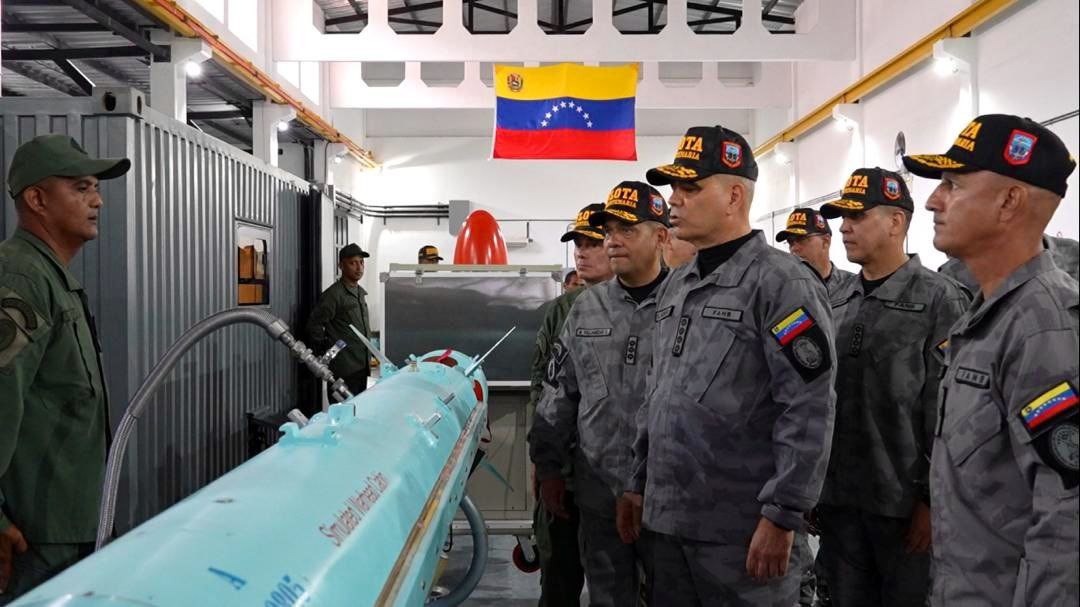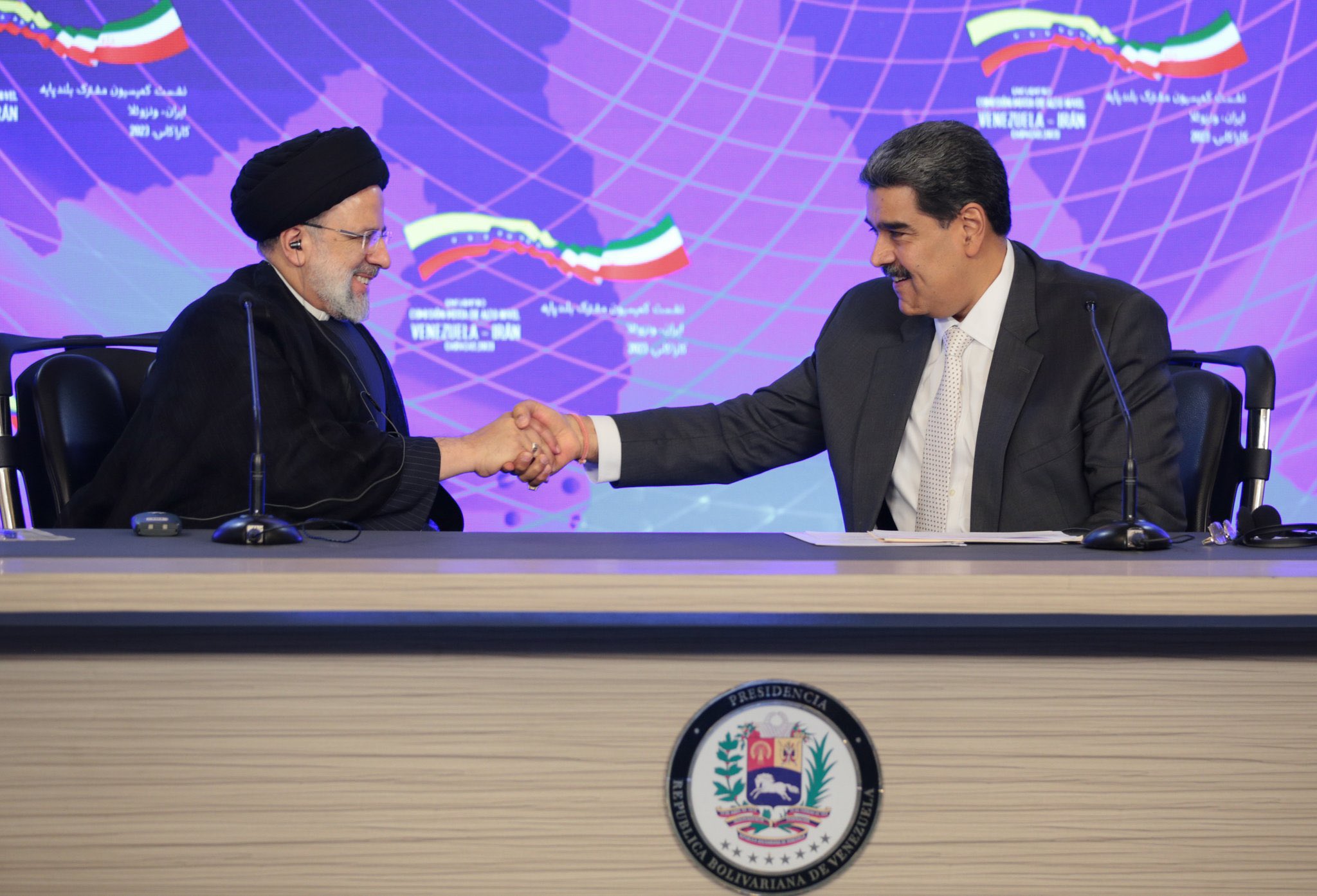Venezuela recently displayed the CM-90 anti-ship missiles acquired from Iran in a move that could be alarming for the United States amid rising hostilities between the two countries.
The Venezuelan military announced on April 16 that it has acquired the CM-90 missile, the export variant of the Nasir anti-ship missile (ASM). The new missiles have been stationed at the “Agustín Armario” Naval Base in Puerto Cabello.
On April 16, as part of the Bolivarian Navy of Venezuela’s (ABV or the Armada Bolivariana de Venezuela) anniversary celebrations, Defense Minister Vladímir Padrino López opened a workshop for the CM-90 at the naval base. Subsequently, photographs and a video showing Padrino examining multiple ASMs and related containerized testing apparatus inside a building were published online.
The CM-90 missiles will presumably be equipped on the Peykaap missile boat, i.e., Iran’s Zolfagar vessels, which Venezuela acquired last year. With anti-ship missile launchers, torpedo tubes, and, in later models, remote weapon stations, these swift and maneuverable vessels are armed to the teeth for robust coastal defense.
The CM-90 missile, which debuted in 2022 at the DIMDEX show, is roughly 4.16 meters long, 280 mm in diameter, and 350 kilograms in weight. Its turbojet engine and active radar guidance system give it a range of roughly 90 kilometers.
Today in Venezuela (🇻🇪), @vladimirpadrino visited the inauguration ceremony of the new CM-90 AShM maintenance facility at Base Naval Agustín Armario.
The missiles are derived from #Iran's (🇮🇷) Nasir and are utilized on the Peykaap III-class missile boat. pic.twitter.com/ljSv9HhJ1z
— SA Defensa (@SA_Defensa) April 16, 2024
According to reports, the Nasir missile was derived from the existing Nasr missile. However, the solid propellant motor of the Nasr was replaced with a turbojet engine and a launch booster to make the missiles more agile and lethal. The Nasir reportedly broke cover in Iran in 2017 and has since been integrated into the Iranian Navy.
The unveiling of the CM-90 missile and a workshop for its upkeep comes days after the President of Venezuela, Nicolas Maduro, accused the US of establishing secret bases in the resource-rich region of Essequibo, a territory that is governed by Guyana and fiercely claimed by Venezuela. Guyana is backed by the US against Venezuela.
“We have confirmation that secret bases of the [United States] Southern Command and the CIA have been installed in the Guyana Essequibo region to prepare attacks on the population of southern and eastern Venezuela,” Maduro said.
Just days later, the Tension between Venezuela and the US reached another high after the United States reimposed sanctions on the Latin American country earlier this week. A license that had significantly reduced oil sanctions against Venezuela was about to expire on April 18.
However, US President Biden announced that the US would not renew it, spelling doom for Venezuela. Washington noted that the decision was in response to President Nicolas Maduro’s inability to fulfill his election-related obligations.

The sweeping sanctions on Venezuela’s oil industry were first slapped by former US President Donald Trump in 2019 in response to Maduro’s victory in re-election, which was disputed by the US and other Western states. This isolation of Venezuela came almost a year after Trump withdrew from the Iran nuclear deal, causing escalation with Tehran.
The isolation and alienation of both Iran and Venezuela eventually led these two countries, located miles away from one another, to forge a relationship for their mutual benefit. A defining component of this relationship has been military cooperation which has become a thorn for Washington now.
Venezuela-Iran Bromance Continues
The acquisition of the missile demonstrates the growing bromance between Iran and Venezuela, both of which have been boycotted by the United States. The purchase may have followed Venezuelan President Maduro’s assertion in 2020 that it would be a “good idea” to look into buying missiles from Iran.

The strategic partnership between Iran and Venezuela, which aims to defend one another against external pressures, especially those from the United States, is reflected in the improvement of their military cooperation over time.
The relationship dates back several decades. In the past, the relationship flourished during the administrations of Mahmoud Ahmadinejad in Iran and Hugo Chávez in Venezuela, with several bilateral agreements in a variety of fields, including military cooperation. This included the building of military facilities in Venezuela and the intended establishment of joint ventures, such as an ammunition factory.
In recent years, the Iran-Venezuela relationship has developed into a strategic alliance under the leadership of President Nicolas Maduro and President Ebrahim Raisi of Iran. During Maduro’s visit to Tehran in 2022, the two nations adopted a roadmap for 20 years of cooperation.

On his maiden trip to Latin America in June 2023, Iran’s hardline president met with his Venezuelan counterpart and iterated that both nations share “a common enemy,” a reference to the United States. The two allies also signed multiple agreements aimed at furthering cooperation.
Insisting that their countries have “common interests and we have common enemies,” Raisi claimed the relationship between the two was “not normal, but rather a strategic relationship.”
“They do not want the two countries, Iran and Venezuela, to be independent,” Raisi said, referring to the US government.
‼️ VENEZUELA – Unveiling of the Zolfaghar – class missile-launching speedboat in Venezuelan Navy
Zolfaghar (Peykaap III-class missile boat) is a class of fast patrol craft operated by the Iranian IRGC Navy. pic.twitter.com/WW57J4tMF0
— {Matt} $XRPatriot (@matttttt187) July 26, 2023
Additionally, previous reports have indicated that Tehran plans to increase oil supplies to Venezuela, hoping to reach 860,000 barrels per day in three years. As part of this plan, refineries in Venezuela will be repaired, and oil will be exported. The objective is to return oil exports from Iran to levels that existed before the US sanctions.
The United States, on its part, has made no bones about watching the blossoming bromance between Iran and Venezuela. Earlier this year, the United States seized a Boeing 747 cargo plane that Iran had sold to a Venezuelan state airline, drawing condemnation from Tehran.
The cooperation between Iran and Venezuela is a worrying precedent for the United States because it brings Tehran’s influence to its backyard. However, the US actions may have contributed to this alliance.
- Contact the author at sakshi.tiwari9555 (at) gmail.com
- Follow EurAsian Times on Google News




